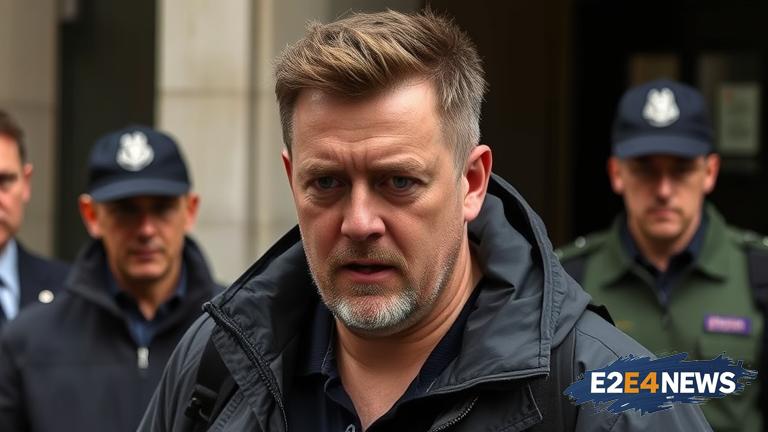Tommy Robinson, a well-known far-right activist, was arrested in London on allegations of assault at a train station. The incident has sparked a heated debate about freedom of speech and the limits of acceptable behavior. Robinson, whose real name is Stephen Yaxley-Lennon, has been a prominent figure in British far-right politics for many years. He has been involved in numerous controversies, including his founding of the English Defence League, a far-right organization that has been accused of promoting Islamophobia and xenophobia. The arrest has been met with a mixture of shock and outrage from Robinson’s supporters, who claim that he is being unfairly targeted by the authorities. However, human rights groups have welcomed the arrest, saying that it sends a strong message that hate speech and violence will not be tolerated. The incident is the latest in a long line of controversies surrounding Robinson, who has been banned from numerous social media platforms for promoting hate speech. Despite this, he remains a popular figure among some sections of the far-right, who see him as a champion of free speech and a critic of Islamic extremism. The arrest has also sparked a wider debate about the role of social media in promoting hate speech and the responsibility of tech companies to regulate online content. Many have called for greater action to be taken against individuals who promote hate speech and violence online, and for social media companies to do more to prevent the spread of extremist ideologies. The incident has also highlighted the ongoing challenges faced by law enforcement agencies in balancing the right to free speech with the need to protect vulnerable communities from hate speech and violence. As the investigation into the alleged assault continues, many will be watching to see how the authorities handle the case and what implications it may have for the wider debate about freedom of speech and hate crime. The arrest of Tommy Robinson is a reminder that the consequences of promoting hate speech and violence can be severe, and that the authorities will take action against those who seek to harm others. It is also a reminder of the importance of protecting vulnerable communities and promoting a culture of tolerance and respect. The incident has sparked a lively debate on social media, with many people expressing their opinions on the arrest and the wider issues surrounding hate speech and freedom of speech. Some have praised the authorities for taking action against Robinson, while others have criticized the arrest as an attack on free speech. As the debate continues, it is clear that the issues surrounding hate speech and freedom of speech are complex and multifaceted, and that there are no easy answers. However, one thing is clear: the promotion of hate speech and violence will not be tolerated, and those who seek to harm others will face the consequences. The arrest of Tommy Robinson is a significant development in the ongoing debate about freedom of speech and hate crime, and it will be interesting to see how the case unfolds in the coming days and weeks. In the meantime, it is essential that we continue to promote a culture of tolerance and respect, and that we do everything in our power to prevent the spread of hate speech and violence. This includes supporting vulnerable communities, promoting education and awareness about the dangers of hate speech, and holding individuals and organizations accountable for their actions. By working together, we can create a safer and more inclusive society for everyone, where freedom of speech is protected and hate speech is not tolerated. The incident has also raised questions about the role of the media in promoting hate speech and the responsibility of journalists to report on extremist ideologies. Many have called for greater scrutiny of the media and its role in promoting hate speech, and for journalists to be more responsible in their reporting. As the investigation into the alleged assault continues, it is essential that we consider the wider implications of the case and the ongoing challenges faced by law enforcement agencies, human rights groups, and vulnerable communities. By doing so, we can work towards creating a safer and more inclusive society for everyone, where freedom of speech is protected and hate speech is not tolerated.





